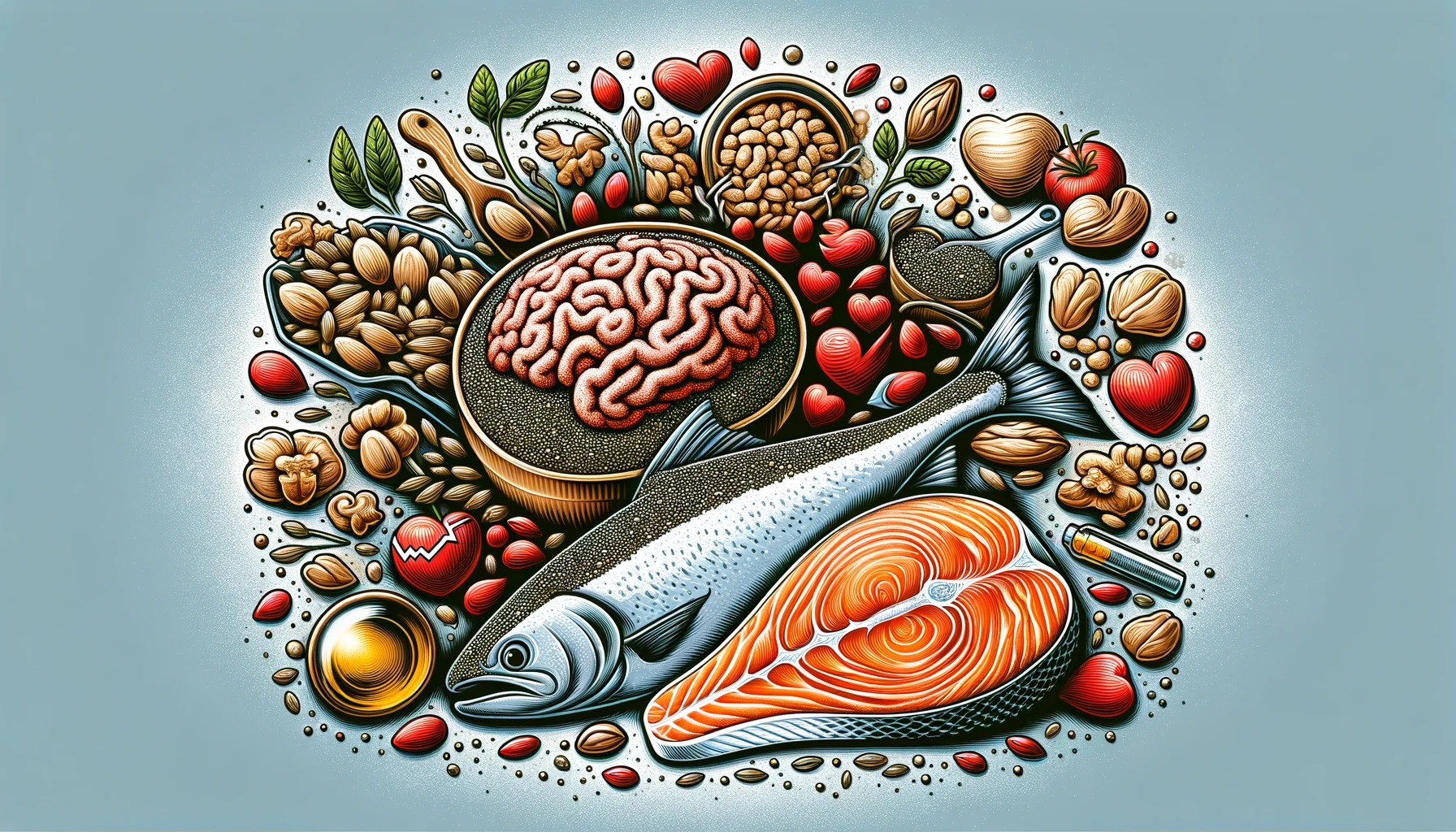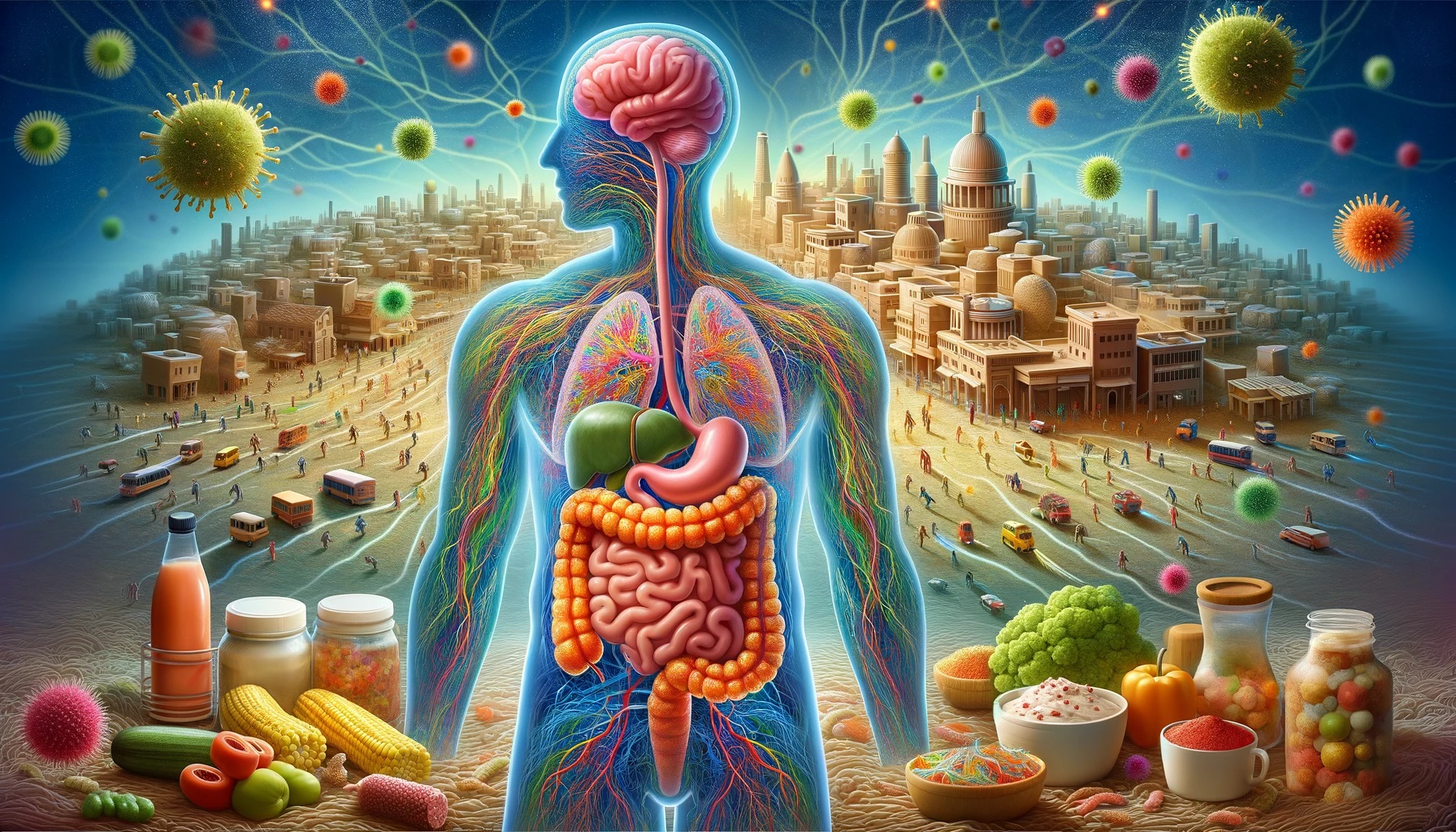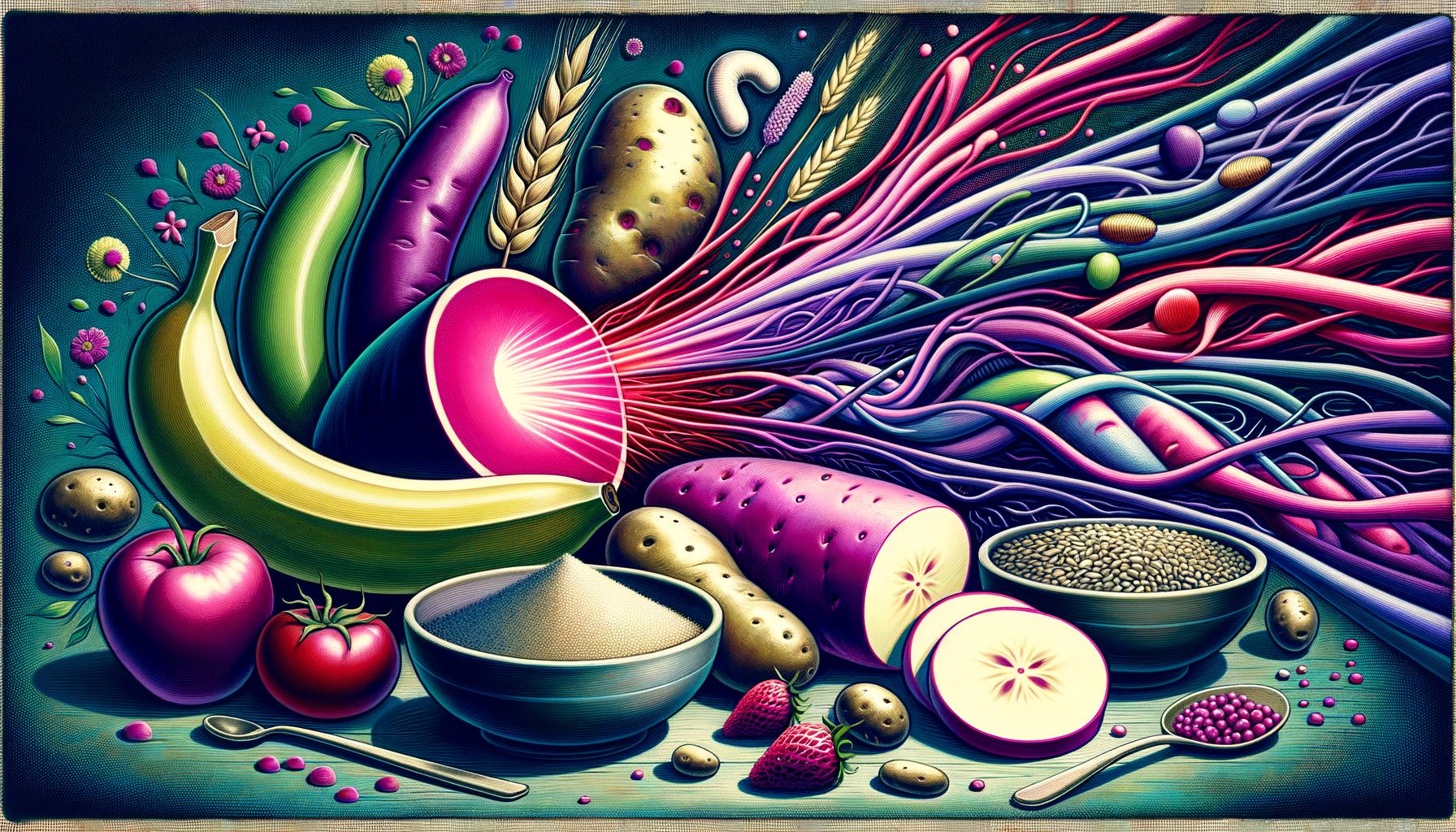· nutrition · 15 min read
Unveiling the Superfood Giant: The Comprehensive Guide to Chia Seeds
Dive deep into the world of chia seeds, exploring their history, nutritional benefits, and essential role in promoting heart and brain health.

In This Post
The Fact Why Should I Care How To Put In Action Start Tomorrow Guide How does it effect my ability to focus How does it impact my daily life How does it help me make friends How does it help me manage stress How does it effect my mood Summary: Remember Refresher Checklist The Full Research Article CitationsPrint Out The Tomorrow Checklist!
Sign up for our newsletter and receive a copy today, so that, you can start tomorrow! Or the next day, or the day after that. I forget everything and starting things is hard at least for me so these checklists are godsend.
Print Out The Remember Refresher Checklist!
Sign up for our newsletter and download your own copy of the Remember Refresher Checklist, so that, you can easily put it on your fridge and help you stay on target towards your WHY. Every little bit helps.
Introduction to Chia Seeds
Unraveling the History and Origin of Chia Seeds
Chia seeds, small yet mighty, have been making waves in the world of nutrition for their dense nutritional profile and vast health benefits. However, their story begins long before they adorned the shelves of health food stores. Originating from Mexico and Guatemala, chia seeds were a staple in the diets of the Aztecs and Mayans, revered not only for their sustenance but also for their medicinal properties. The name “chia” itself derives from the Nahuatl word “chian,” meaning oily, which aptly describes the high omega-3 fatty acid content of the seeds.
Historically, chia seeds were so valued that they were even used as currency. Warriors and athletes in ancient societies consumed chia seeds for energy and endurance, highlighting their ancient recognition as a superfood. Despite their centuries-old use, chia seeds have experienced a renaissance in modern times, thanks to a growing awareness of their health benefits and versatility in meals and snacks.
The journey of chia seeds from ancient superfood to contemporary health essential is a testament to their enduring nutritional value and the growing quest for food sources that offer more than just sustenance.
The Nutritional Profile of Chia Seeds: Beyond Omega-3 Fatty Acids
While most renowned for their high content of omega-3 fatty acids, chia seeds offer a plethora of nutrients that bolster their superfood status. This tiny seed is a nutritional powerhouse, providing a range of vital nutrients that play essential roles in maintaining a healthy body.
Essential Nutrients Found in Chia Seeds:
- Omega-3 Fatty Acids: Essential for heart health and brain function, offering anti-inflammatory benefits.
- Dietary Fibers: Aid in digestion, promoting a healthy digestive system and contributing to weight management efforts.
- Antioxidants: Protect the body from the damaging effects of free radicals, reducing the risk of chronic diseases.
- Protein: High-quality, plant-based protein that is especially beneficial for vegetarians and vegans.
- Minerals: Calcium, magnesium, and phosphorus contribute to bone health, while manganese plays a role in metabolism and zinc aids in immune function.
In comparison to other seeds, chia seeds stand out for their hydrophilic properties, allowing them to absorb up to 12 times their weight in water. This unique feature makes them invaluable for hydration and maintaining a feeling of fullness, aiding in weight management.
A Quick Checklist of Chia Seed Benefits:
- Rich source of omega-3 fatty acids
- High in dietary fibers
- Packed with antioxidants
- Protein-rich
- Offers essential minerals for overall health
Their gluten-free and vegan-friendly profile further broadens their appeal, making chia seeds a versatile addition to any diet. Whether sprinkled on salads, blended into smoothies, or used as an egg substitute in vegan baking, chia seeds seamlessly integrate into daily meals, offering both nutrition and variety.
The profile and benefits of chia seeds go beyond simple nutrition; they embody a holistic approach to health, from heart to brain function, weight management, and beyond. Their historical significance, combined with modern-day science, cements their status as more than just a trend but as a sustainable, nutrient-rich food source for generations to come.
Chia Seeds vs. Salmon: A Nutritional Showdown
Breaking Down the Omega-3 Power in Chia Seeds
Omega-3 fatty acids are crucial for overall health, influencing heart health, brain function, and inflammation reduction. Chia seeds emerge as a powerful source of these essential nutrients. Unlike other plant-based omega-3 sources, chia seeds provide ALA (alpha-linolenic acid), which the body can convert to EPA and DHA - the types of omega-3 found in fish oil. Approximately two tablespoons of chia seeds contain almost 5 grams of omega-3 fatty acids, showcasing their potent nutritional value in a small serving.
Comparing Nutritional Benefits: Chia Seeds and Salmon
When pitched against salmon, widely recognized for its high omega-3 content, chia seeds hold their ground impressively. Both are exceptional sources, but they cater to different dietary preferences and needs. Below is a detailed comparison:
- Omega-3 Content: Salmon provides EPA and DHA directly, beneficial for heart and brain health. Chia seeds, meanwhile, offer ALA that the body partially converts to EPA and DHA.
- Protein: Salmon is an excellent protein source, crucial for muscle repair and growth. Chia seeds also contain a significant amount of protein, especially beneficial for those following a vegetarian or vegan diet.
- Fiber: Chia seeds triumph in fiber content, aiding in digestion, weight management, and blood sugar stabilization. Salmon does not provide dietary fiber.
- Antioxidants: Rich in antioxidants, chia seeds help combat oxidation and inflammation, whereas salmon’s antioxidant content is comparatively lower.
- Versatility in Diet: Chia seeds are gluten-free and vegan, fitting into a wider variety of dietary restrictions than salmon.
The Environmental and Dietary Impact of Choosing Chia
Opting for chia seeds over salmon presents both environmental and dietary advantages. The cultivation of chia seeds demands lower water usage and land, making it a more sustainable choice. Furthermore, chia seeds avoid the ethical and ecological concerns associated with overfishing and fish farming.
For individuals with dietary restrictions or those seeking plant-based nutrient sources, chia seeds offer an excellent alternative. Their shelf-stable nature also allows for a longer storage duration without compromising nutritional value, unlike salmon which requires refrigeration and has a shorter shelf life.
- Check the source of your chia seeds for sustainability and organic certification.
- Incorporate chia seeds into your diet through various means - be it in smoothies, as egg substitutes, or in baked goods.
- Consider your dietary needs - if you require direct sources of EPA and DHA, supplementing with chia seeds alone may not suffice.
- Evaluate environmental impacts - opting for plant-based sources when possible to reduce your ecological footprint.
Choosing between chia seeds and salmon for omega-3 intake depends on personal preferences, dietary restrictions, and environmental considerations. Both options provide substantial health benefits, but chia seeds offer a versatile, sustainable, and inclusive choice for those looking to boost their nutritional intake.
Chia Seeds: A Keystone of Brain and Heart Health
The conversation around superfoods is incomplete without highlighting the significant impact of chia seeds on heart and brain health. These tiny seeds are not only a nutritional powerhouse but also a testament to how diet can influence the fundamental aspects of our well-being.
Exploring the Cardiac Benefits of Chia Seeds
Chia seeds have earned their spot at the table of heart-healthy foods for several reasons. Firstly, their high Omega-3 fatty acid content is a boon for heart health. These essential fats are known for their anti-inflammatory effects, which help reduce the risk of chronic heart diseases. Omega-3 fatty acids also play a crucial role in lowering high blood pressure and cholesterol levels, both significant risk factors for heart-related issues.
Additionally, chia seeds are a rich source of dietary fibers. A diet high in fiber can improve overall heart health by regulating blood pressure and lowering cholesterol levels. The soluble fiber found in chia seeds forms a gel when in contact with water, which can help decrease LDL cholesterol levels and slow the absorption of sugar into the bloodstream, further supporting a healthy heart.
Here are a few benefits of incorporating chia seeds into your diet for heart health:
- Reduction in inflammation linked to heart disease
- Improved cholesterol management
- Enhanced blood pressure regulation
- Stabilization of blood sugar levels
How Chia Seeds Boost Brain Function
Not only do chia seeds offer substantial benefits for heart health, but they also contribute to improved brain function. The Omega-3 fatty acids found in chia seeds are essential for brain health, particularly EPA and DHA. These fatty acids contribute to the structure of the brain cell membranes and facilitate communication between brain cells.
Furthermore, chia seeds contain antioxidants that protect the brain from oxidative stress and aging. The antioxidants in chia seeds, such as quercetin, kaempferol, and myricetin, have been linked with improved brain function and a reduced risk of neurodegenerative diseases.
Regular consumption of chia seeds can contribute to:
- Enhanced memory and focus
- Reduced risk of depression and anxiety
- Protection against aging-related cognitive decline
Comprehensive Studies and Supporting Evidence
A plethora of studies have underscored the health benefits of chia seeds. For instance, research has indicated that diets rich in Omega-3 fatty acids can reduce the risk of heart diseases and improve brain health, including memory and cognitive functions. Furthermore, dietary interventions including chia seeds have shown promising results in reducing cardiovascular risk factors, such as lowering LDL cholesterol and triglycerides.
To gain a deeper understanding of the connection between chia seeds, heart health, and brain function, reference the following resources:
- World Health Organization on Omega-3 Fatty Acids: Discover the essential role of Omega-3s in heart and brain health.
- Heart-Healthy Diet Recommendations: Learn about how incorporating foods like chia seeds can contribute to a healthy heart.
- Brain Benefits of Omega-3 Fatty Acids: Explore the surprising ways Omega-3s, abundant in chia seeds, benefit your brain.
By embracing chia seeds as part of your diet, you’re not only nurturing your heart but also fortifying your brain health, all thanks to the impressive nutritional composition of these small, but mighty seeds.
Incorporating Chia Seeds into Your Diet
Chia seeds are incredibly versatile and easy to incorporate into your daily diet, offering a plethora of health benefits including an abundance of Omega-3 fatty acids, fiber, and antioxidants. Whether you’re looking to improve heart health, brain function, or simply add a nutritional powerhouse to your meals, chia seeds are an excellent choice. In this part of the guide, we’ll provide several ideas, recipes, precautions, and tips for optimal consumption of chia seeds.
Ideas for Chia Seed Meals and Snacks
Chia seeds can be added to virtually any dish, thanks to their mild flavor and impressive health benefits. Here are some creative ways to integrate chia seeds into your meals and snacks:
- Morning Kickstart: Sprinkle chia seeds over your breakfast cereal or stir them into your morning yogurt for an instant energy boost. Incorporating them into smoothies is also a popular choice for a nutritious breakfast on the go.
- Baking and Cooking: Chia seeds can serve as a vegan egg substitute in baking. Simply mix 1 tablespoon of chia seeds with 3 tablespoons of water and let it sit for a few minutes until gelatinous. This mixture can replace one egg in recipes for cakes, cookies, and more.
- Healthy Snacking: Prepare chia pudding by soaking chia seeds in milk (dairy or plant-based) and leaving them overnight. Add your favorite sweeteners or fruits and enjoy a delicious and healthy snack.
- Salads and Soups: Sprinkle chia seeds onto salads or stir them into soups and stews for an extra dose of nutrients.
Recipes and Recommendations for Daily Intake
Integrating chia seeds into your daily diet can be both simple and delicious. Here are a couple of recipes to get you started:
- Chia Seed Pudding: Combine 1/4 cup of chia seeds with 1 cup of your preferred milk in a jar. Add a touch of maple syrup, vanilla extract, and a pinch of salt for flavor. Let the mixture sit for a few hours or overnight until it thickens. Top with fresh fruit before serving.
- Lemon Chia Fresca: Mix the juice of one lemon, 2 cups of water, 2 teaspoons of chia seeds, and a sweetener of your choice to taste. Let it sit for 10-15 minutes until the chia seeds have expanded. This refreshing drink is perfect for hydration and energy.
For optimal nutrition, it’s recommended to consume about 1.5 to 2 tablespoons of chia seeds daily. Here’s a simple checklist to ensure you’re integrating chia seeds into your diet effectively:
- Add chia seeds to your breakfast, whether in smoothies, cereals, or yogurts
- Use chia seeds as a nutritional booster in baking and cooking
- Explore chia-based snacks like puddings or energy bars
- Experiment with chia seeds in soups, salads, and beverages for added texture and nutrients
Precautions and Optimal Consumption Tips
While chia seeds are generally safe and beneficial for most people, there are a few precautions to keep in mind:
- Hydration: Due to their hydrophilic properties, chia seeds can absorb up to 27 times their weight in water. It’s crucial to stay well-hydrated when consuming chia seeds, especially in raw form.
- Digestive Adjustments: Start with a small serving size and gradually increase it to allow your body to adjust to the high fiber content.
- Allergies: Although rare, some people may have allergies to chia seeds. If you experience any adverse reactions, stop consumption immediately and consult a healthcare provider.
Incorporating chia seeds into your diet is a simple and effective way to enhance your nutritional intake. By following the ideas, recipes, and tips provided, you can seamlessly add this superfood to your daily meals and reap the numerous health benefits it offers.
FAQs (Based on “People Also Ask” Section from Google)
How do Chia Seeds Compare to Other Superfoods in Omega-3 Content?
Chia seeds have gained substantial attention for their omega-3 fatty acid content, standing tall among other superfoods. The distinguishing feature of chia seeds is their high alpha-linolenic acid (ALA) content, a type of omega-3 fatty acid crucial for maintaining heart health and reducing inflammation. When compared to flaxseeds, another popular omega-3 rich superfood, chia seeds offer a unique advantage due to their hydrophilic properties, allowing them to absorb water and form a gel-like substance, thus making them more versatile in culinary applications. Furthermore, their shelf-stable nature and the fact that they don’t need to be ground to release their nutritional benefits position them favorably against other sources like walnuts or hemp seeds.
Notably, chia seeds contain more omega-3 fatty acids by weight than salmon, without the environmental and dietary concerns associated with fish consumption. They provide a sustainable, plant-based alternative for those looking to increase their intake of this essential nutrient without relying on animal products.
Can Chia Seeds Truly Improve Brain Health?
Chia seeds’ impact on brain health is profound, primarily attributed to their robust omega-3 fatty acid content. The brain is rich in omega-3 fatty acids, which are essential for cognitive processes and maintaining neuronal health. Here’s a checklist of how chia seeds can be beneficial for brain health:
- Rich in Omega-3 Fatty Acids: Fosters neuroprotection and aids in the maintenance of cell membrane integrity.
- High Antioxidant Levels: Combats oxidative stress and reduces the risk of chronic brain diseases.
- Ample Dietary Fibers: Promotes gut health, which is linked to improved mood and cognition through the gut-brain axis.
Supporting evidence from research suggests that a diet high in omega-3 fatty acids from sources like chia seeds can mitigate the risk of degenerative mental diseases, improve memory and learning, and potentially elevate mood. Incorporating chia seeds into the diet offers a holistic approach to brain health, showcasing their role beyond just a nutrient-rich superfood.
What Are the Potential Side Effects of Consuming Chia Seeds?
While chia seeds are generally safe for most individuals, there are potential side effects worth noting, especially when consumed in excessive amounts or without proper preparation. Here’s what to be mindful of:
- Digestive Issues: Due to their high fiber content, ingesting too many chia seeds can lead to abdominal discomfort, bloating, or gas for some people. It’s crucial to increase fiber intake gradually and ensure adequate hydration.
- Allergic Reactions: Though rare, some individuals might experience allergic reactions to chia seeds, presenting as skin rashes or gastrointestinal discomfort.
- Blood Thinning Effect: Chia seeds have a blood-thinning effect due to their omega-3 fatty acid content. Those on blood-thinning medication should consult with a healthcare provider before incorporating chia seeds into their diet.
To minimize potential risks, it’s advisable to start with a small serving of chia seeds and gradually work up to the recommended daily intake, paying attention to the body’s response and ensuring proper hydration throughout the day.
Conclusion
Recap of the Multifaceted Benefits of Chia Seeds
Chia seeds, the tiny but mighty superfood, have shown themselves to be a nutritional powerhouse amidst the vast array of health foods available today. With their rich content of Omega-3 fatty acids, chia seeds stand out as a sustainable and vegan-friendly source, promoting heart health and efficient brain function. Their high dietary fibers, proteins, antioxidants, and hydrophilic properties contribute significantly to inflammation reduction, cholesterol management, and weight management. Moreover, chia seeds boost energy levels and help stabilize blood sugar, making them an excellent food choice for a diverse range of dietary needs including gluten-free and vegan diets.
Throughout this guide, we have explored the unique characteristics that make chia seeds a superior nutritional choice, comparing them to other superfoods and illustrating their benefits for the heart and brain. We’ve provided practical tips on integrating chia seeds into your diet, ensuring you can enjoy their benefits in a variety of tasty and nutritious meals.
Encouragement to Integrate Chia Seeds into Daily Nutrition
To make the most out of chia seeds and to truly harness their health benefits, consider integrating them into your daily nutrition through thoughtful and innovative ways. Here’s a quick checklist to get you started:
Begin your day with a chia-based smoothie or add chia seeds to your morning yogurt.
Incorporate chia seeds into your baking recipes, such as bread, muffins, or pancakes.
Use chia seeds as a salad topping for an extra crunch and a nutritional boost.
Prepare a chia pudding as a healthy dessert or snack option.
Experiment with chia seeds as a thickening agent in soups and gravies.
Remember, the journey to better health is a marathon, not a sprint. Integrating chia seeds into your diet is a simple yet effective step towards achieving a balanced and nutritious lifestyle. With their exceptional health benefits and versatility in the kitchen, chia seeds are undoubtedly a superfood worth incorporating into your daily regimen. Let the power of chia seeds work for you, and embrace a healthier, more vibrant lifestyle.
Recommended Resources
- superfood
- omega-3-fatty-acids
- heart-health
- brain-function
- nutritional-comparison
- sustainable-food-source
- dietary-fibers
- antioxidants
- protein-rich-seeds
- hydrophilic-properties
- seed-based-nutrition
- gluten-free
- vegan-source-of-omega-3
- nutritional-powerhouse
- inflammation-reduction
- cholesterol-management
- weight-management
- energy-boost
- blood-sugar-stabilization





